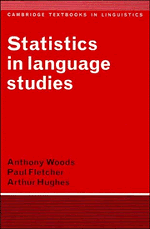Book contents
- Frontmatter
- Contents
- Preface
- 1 Why do linguists need statistics?
- 2 Tables and graphs
- 3 Summary measures
- 4 Statistical inference
- 5 Probability
- 6 Modelling statistical populations
- 7 Estimating from samples
- 8 Testing hypotheses about population values
- 9 Testing the fit of models to data
- 10 Measuring the degree of interdependence between two variables
- 11 Testing for differences between two populations
- 12 Analysis of variance – ANOVA
- 13 Linear regression
- 14 Searching for groups and clusters
- 15 Principal components analysis and factor analysis
- Appendix A Statistical tables
- Appendix B Statistical computation
- Appendix C Answers to some of the exercises
- References
- Index
5 - Probability
Published online by Cambridge University Press: 05 June 2012
- Frontmatter
- Contents
- Preface
- 1 Why do linguists need statistics?
- 2 Tables and graphs
- 3 Summary measures
- 4 Statistical inference
- 5 Probability
- 6 Modelling statistical populations
- 7 Estimating from samples
- 8 Testing hypotheses about population values
- 9 Testing the fit of models to data
- 10 Measuring the degree of interdependence between two variables
- 11 Testing for differences between two populations
- 12 Analysis of variance – ANOVA
- 13 Linear regression
- 14 Searching for groups and clusters
- 15 Principal components analysis and factor analysis
- Appendix A Statistical tables
- Appendix B Statistical computation
- Appendix C Answers to some of the exercises
- References
- Index
Summary
The link between the properties of a sample and the structure of its parent population is provided through the concept of probability. The concept of probability is best introduced by means of straightforward non-linguistic examples. We will return to linguistic exemplification once the ideas are established. The essentials can be illustrated by means of a simple game.
Probability
Suppose we have a box containing ten plastic discs, of identical shape, of which three are red, the remainder white. The discs are numbered 1 to 10, the red discs being those numbered 1, 2 and 3. The game consists of shaking the box, drawing a disc, without looking inside, and noting both its number and its colour. The disc is returned to the box and the game repeated indefinitely. What proportion of the draws do you think will result in disc number 4 being drawn from the box? One draw in three? One draw in five? One draw in ten?
Surely we would all agree that the last is the most reasonable. There are ten discs. Each is as likely to be drawn as the others every time the game is played. Since there are ten discs with different numbers, we should expect that each number will be drawn about one-tenth of the time in a large number of draws, or trials as they are often called.
- Type
- Chapter
- Information
- Statistics in Language Studies , pp. 59 - 76Publisher: Cambridge University PressPrint publication year: 1986
- 1
- Cited by



